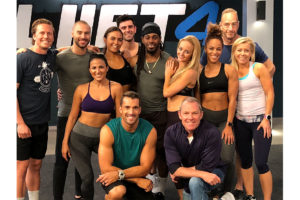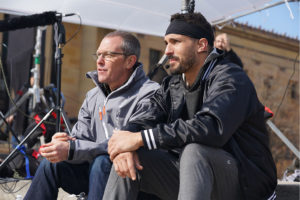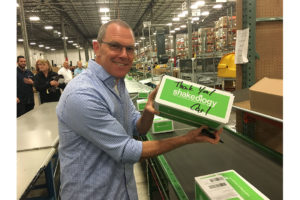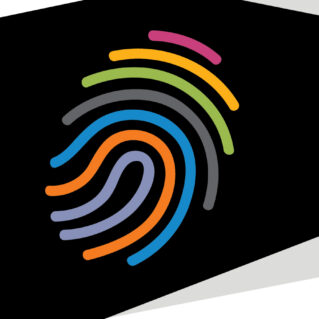Beachbody’s Carl Daikeler Earns Bravo Leadership Award.
It is 1998 in California. Gyms pop up on every corner, new fitness gadgets fly onto the market, exercise equipment infomercials flood TVs, and Carl Daikeler’s mentors ask tough questions. What makes you think the world needs another fitness company?
Where’s the opportunity?
“I said the idea is that whoever can make the living room, the garage, or the spare bedroom as effective and maybe, even more, gratifying a place to work out as the gym is going to create billions of dollars of opportunity,” Daikeler remembers.
That was the premise when he and partner Jon Congdon founded Beachbody. As Daikeler chatted about his company and career from his California home in early March, the world was changing by the hour and Beachbody’s premise seemed increasingly on point.
“Here we find ourselves in this pandemic in 2020, and I can honestly say it has never been more valued than right now. This concept of making fitness gratifying at home is very powerful,” Daikeler says.
Over two hundred million people in North America don’t have a gym membership. They lack a good approach to proper nutrition for wellness and weight loss that is scalable to the entire family. As Co-Founder and CEO, Daikeler’s mission goes beyond selling them a product like Shakeology™ or a subscription to Beachbody On Demand digital workout platform. He leads 350,000 distributors—for whom they coined the term “coaches”—who build self‑esteem, provide a service of accountability for people who actually want to get results, and to help anyone and everyone achieve their goals to be healthy and live fulfilling lives.
Stars Aligned Without His Knowing
Once, a twenty-something Carl Daikeler settled into the producer’s chair inside a TV production truck at the Army vs. Syracuse football game. His first job out of college. He called the nationally televised halftime show countdown and nailed the production job. He had skills. It was a big step toward his dream of someday producing the Olympics. But something didn’t feel right when he climbed out of the truck to the roar of the fans as the players were returning to the field.
“This concept of making fitness gratifying at home is very powerful.” – Carl Daikeler, Co-Founder, Chairman and Chief Executive Officer
“Literally, the first day of my dream job, and I thought to myself, ‘This is not what I want to do. This is just covering the activities of others. That’s not what I want to do. I want to influence people and solve problems,’” Daikeler remembers.
Creativity solves problems, and Daikeler new about creativity. Growing up, his family did a lot of coloring outside the boxes. Both Daikeler’s grandfathers were inventors and great salesmen. His parents co-owned the Bucks County Playhouse, a summer-stock theatre in Pennsylvania, where the business side of the creative process—the marketing challenge of getting people to buy tickets every summer—drew Carl in at a young age. In his teens, he was cutting his teeth in television production at his high school’s full-color TV studio—an oddity in the late 1970s.
“I think whenever you look in the rearview mirror, the path looks obvious. But at the time, it was anything but obvious that I would be the CEO of a company whose mission is to help people with their health and fitness,” Daikeler says.
But stars had aligned without his knowing. All that was missing was a problem to solve, and Daikeler didn’t have far to look. The now 30-something firmly disliked exercise and “eats like a second-grader.”
When he daydreamed aloud about creating a workout that would take just ten minutes a day he suspected he could get in shape that way. As it turned out, lots of people could relate.
Media Production the Informercial Way
The infomercial market in the 90s was huge, and Daikeler was poised to contribute. The idea was simple: Create a short workout video–10 minutes at most–to get fit at home on your own time. A video series would emerge, but the first was :08 Min Abs, produced for TelAmerica Media in 1994.
“We created that for next to nothing and sold over two million of them for $19.95. That was the beginning of my creating product to help me solve my own problem,” he says.
“I think whenever you look in the rearview mirror, the path looks obvious. But at the time, it was anything but obvious that I would be the CEO of a company whose mission is to help people with their health and fitness.” – Carl Daikeler
In 1998 Daikeler and partner Jon Congdon started a new company called Beachbody and had a blockbuster fitness program in their sights with a $500,000 angel investment. After a string of early successes, they launched P90X, a three-month intensive fitness boot camp program, without cash for celebrity endorsements so they featured their own before and after pictures into their infomercials for ‘founders’ credibility.
For nearly a decade, Beachbody had millions of customers getting in shape with P90X, Brazil Butt Lift, and later, Insanity. Through self-discipline and eating right, customers turned into walking billboards for Beachbody’s fitness program success. Everyone wanted in on the secret to getting fit when a “beachbody” walked into the room. But lingering on the fringes was a dynamic of customer false-starts or no-starts at all. People bought in but didn’t follow through. That didn’t sit well with Daikeler.
In 2007, an evolution in Beachbody thinking was underway. As Daikeler tells it with a wink, “We wandered into [direct selling] and found out it was an industry.”
Bridging Multiple Sales Channels
“How was a guy like me—a guy that hates fitness and hates eating vegetables—able to have the discipline to be one of the very first transformation stories for P90X? It’s because I had a financial incentive. So, we thought, what if we could provide a financial incentive to customers, so that for the ones that struggle, they will have a financial incentive just like I did?” he asked.
“I would love nothing more than what we do as an industry to be the thing that easily picks up the slack, so people can instantly start creating an income for themselves by being of service directly to people.” – Carl Daikeler
And with that, Beachbody leaped into multi-channel sales and created a brand-new financial incentive for its customers.
Traditionalists would bristle at Beachbody’s new business strategy, objecting to perceived channel conflicts between customers and the company’s existing and very successful direct marketing business. An affiliate structure with commissions wouldn’t help the person beyond the initial transaction, and that’s the leverage they really wanted. So,  Beachbody devised a win/win.
Beachbody devised a win/win.
Coaches from the network marketing side bring customers in and form Beachbody On Demand (BOD) groups from their own warm markets. Likewise, the company generates direct marketing leads and attaches them to qualified Coaches. Those leads/customers have the social support virtually of someone who has been through Beachbody’s program, understands how it works and can provide accountability.
“That’s a value proposition to both sides of the market. The customer gets the benefit of a coach, and the coach gets the benefit of the lead. We don’t sell it to them. We just give it to them because we want to help that customer get results,” Daikeler says.
“That’s an innovation that has not always been completely understood by the industry or even by our coaches. Now that we’re 12 years in the industry, I think it has set a new benchmark for how multiple sales channels can actually complement each other,” Daikeler says.
And now, in the midst of an unprecedented world health crisis, there are new industry benchmarks to set. Daikeler muses aloud about how direct selling companies would love 100 percent of distributors engaged and creating financial rewards and contributing to the customers that they serve.
“In an environment like right now, where we’re going to see widespread unemployment and it’s going to spike, I would love nothing more than what we do as an industry to be the thing that easily picks up the slack, so people can instantly start creating an income for themselves by being of service to people. But that means they need to be more than just a sales channel,” Daikeler says. “We need to help them get results.” DSN


